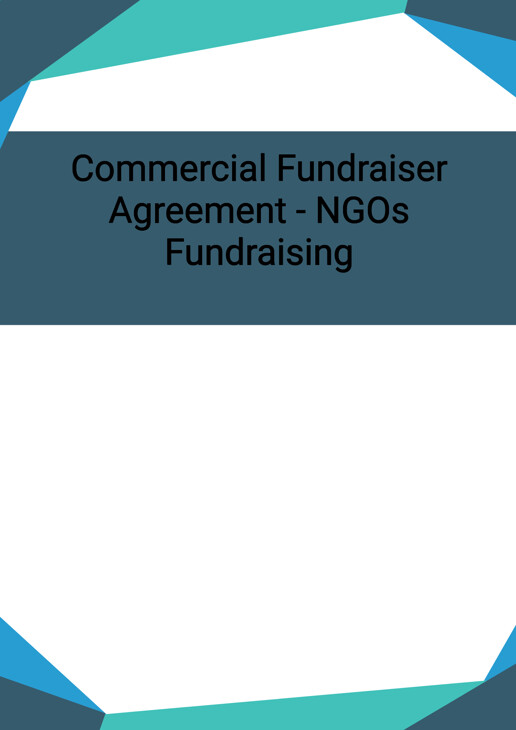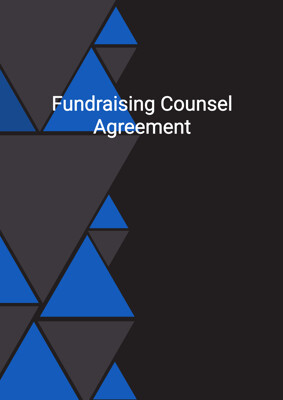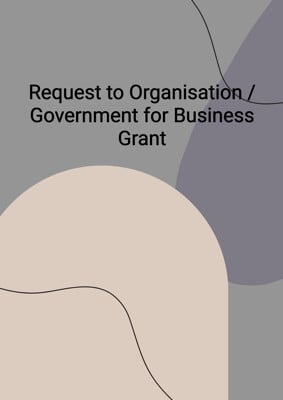How to Tailor the Document for Your Need?
01
Create Document
Fill in the details of the parties. You can click the "Fill with Member’s Information" button to complete it with information saved to your account.
02
Fill Information
Please fill in any additional information by following the step-by-step guide on the left hand side of the preview document and click the "Next" button.
03
Get Document
When you are done, click the "Get Document" button and you can download the document in Word or PDF format.
04
Review Document
Please get all parties to review the document carefully and make any final modifications to ensure that the details are correct before signing the document.
Document Preview
Document Description
A commercial fundraiser agreement is a formal contract between a nonprofit organization (often a charity) and a commercial fundraiser. This agreement outlines the terms under which the commercial fundraiser will solicit donations, manage fundraising events, or conduct campaigns on behalf of the nonprofit. These agreements are essential to ensure compliance with laws governing charitable fundraising, transparency for donors, and accountability for both parties.
Key Elements of a Commercial Fundraiser Agreement:
-
Roles and Responsibilities:
- Defines the scope of services the commercial fundraiser will provide.
- Specifies how funds will be solicited (e.g., phone campaigns, online campaigns, events).
-
Fee Structure:
- Outlines the compensation model for the fundraiser (e.g., flat fee, percentage of funds raised, or hybrid structure).
- Includes details on how expenses will be handled.
-
Compliance:
- Ensures adherence to federal, state, and local laws, including registration requirements for fundraisers.
- May reference specific statutes like the Charitable Solicitation Act or similar regulations.
-
Transparency:
- Specifies how donors will be informed about the relationship between the nonprofit and the commercial fundraiser.
- Details reporting requirements for the fundraiser (e.g., periodic financial reports).
-
Term and Termination:
- Sets the duration of the agreement and conditions under which it can be terminated by either party.
-
Performance Metrics:
- May include targets or goals for the campaign, such as fundraising amounts or donor engagement levels.
-
Conflict of Interest and Confidentiality:
- Addresses conflicts of interest to ensure the fundraiser acts in the nonprofit's best interest.
- Protects sensitive donor and organizational information.
-
Dispute Resolution:
- Describes how disputes between the nonprofit and fundraiser will be resolved.
This document is important for fundraising campaigns because many jurisdictions require written agreements for fundraising activities to protect donors and maintain nonprofit integrity.
In addition, it also clarifies expectations and ensures funds raised are used as intended. And it further demonstrates transparency and professionalism, fostering trust among contributors.
It is advised that nonprofits must carefully draft and review these agreements, often with legal advice, to avoid potential pitfalls and protect their mission.
How to use this document?
1. Get yourself familiar with the terms. Before signing the agreement, both parties should negotiate the terms based on the needs of the nonprofit and the services the commercial fundraiser can provide.
2. Once you have agreed on the terms, then put your agreed terms in writing. Both parties should be clear on their responsibilities, and the document should cover all key areas, including:
- Clear definitions of the roles of both the nonprofit and the fundraiser.
- The fee structure and how funds will be distributed or used.
- Legal compliance, such as reporting requirements or state registration obligations.
- Provisions for donor transparency and disclosures.
- Termination clauses, in case either party wants to end the agreement before it’s up.
You may want to consult with a lawyer to ensure the terms are legally sound and compliant with applicable laws, especially state or federal regulations for charitable fundraising.
3. Once both parties are satisfied with the terms, sign the agreement. It’s often a good idea for both parties to have copies of the signed contract for their records. If you’re a nonprofit, ensure that the signature is from an authorized representative, such as an executive director or board member.
Please note that this guidance is a summary and should be used as a reference. It is important to refer to the actual agreement for the full details and to seek legal advice if needed.
Not the right document?
Don’t worry, we have thousands of documents for you to choose from:










